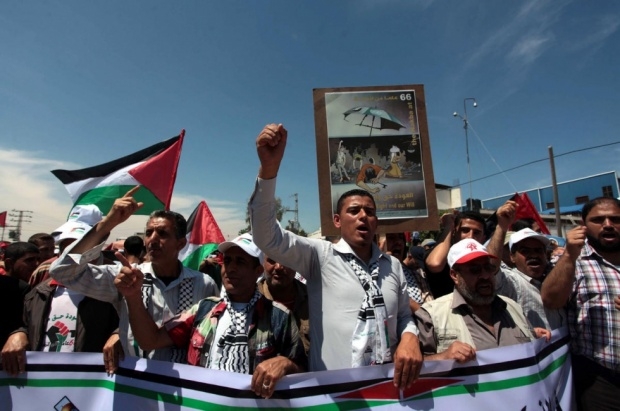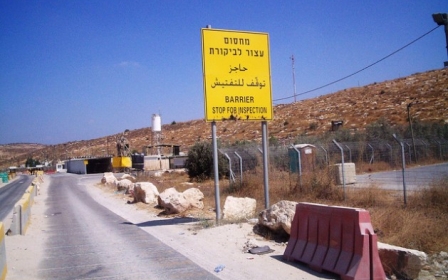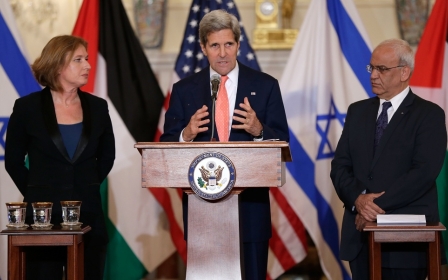The battle for justice in Palestine

Ali Abunimah opens his new book, The Battle For Justice In Palestine with the startling claim, “The Palestinians Are Winning”. His central thesis is that the world is wising up to Israel, and that the two-state solution is dead after decades of wasted negotiation. A one-state solution - the only choice left, he feels - is to the Palestinians' advantage.
This is a timely study, given the failure of the latest round of peace talks, but how realistic is this optimism?
Abunimah, who lives in the US, makes an original start by challenging America's claim to global moral leadership - America being Israel's protector and main international advocate.
The writer argues that racism remains endemic in the US where it is has been re-directed into the criminalisation and incarceration of disproportionate numbers of black people under the banner of “the war on drugs”; now Muslims have also become a target of this xenophobia in the course of the “war on terror”. Paradoxically, the situation has worsened under Barack Obama and, with seven millions in jail, “America imprisons more of its racial and ethnic minorities than any other country in the world.”
Unsurprisingly, this pattern is mirrored in Israel where Palestinians are routinely detained without charge and kangaroo courts have a conviction rate of 99.75 percent. When it comes to cases against Israeli soldiers for violent attacks on Palestinians, however, 94 percent are dropped.
Like “decent white folks” near an American Black or Latino ghetto, Israel is often portrayed as “living in a tough neighbourhood” where the 'Arabs' are a constant menace to their peace and security. Abunimah challenges this myth, together with the notion that Israel is the “only democracy in the Middle East”, describing instead a society as deeply racist and unequal as its American sponsor.
Abunimah revisits the territory of several other books with an exposé of Israel's colonialism and apartheid machinery, but does so as part of his thesis that the two-state solution is no longer possible. A racist ghetto-isation of the Palestinians into a shrinking (due to illegal settlement building) West Bank and Gaza, and the refusal to allow those in the diaspora the right to return, cannot accommodate their legitimate (and legal) right to self-determination.
In an interesting analysis, Abunimah suggests that Israeli Prime Minister Benjamin Netanyahu has admitted the failure of Zionism with his demand that the Palestinians recognize Israel as “a Jewish State”. “The Zionist project,” Abunimah infers, “can never enjoy legitimacy or stability without the active consent of the Palestinian people.”
The colonialist, apartheid nature of the state of Israel is recognised more widely than ever before, by people, if not governments. Abunimah insists that lasting solutions can only evolve from the grass roots. The growth of the international Palestinian solidarity movement and the Boycott Divestment Sanctions (BDS) movement are crucial developments. The writer urges new, outside the box thinking on the Palestinian question and revisits the recent histories of South Africa and Northern Ireland, describing in (perhaps too intricate) detail the processes by which each achieved a previously unthinkable reconciliation.
Abunimah suggests that the current Palestinian leadership is no longer fit for purpose when Palestinian Authority President, Mahmoud Abbas, can declare, “We do not support the boycott of Israel” - a view which is at odds with the dreams of millions of Palestinians - and technocrats, like former Prime Minister Salman Fayyad, seek to impose an American/IMF agenda.
The wrong leadership at the crucial moment, the writer argues, leads to a new state being "born in chains".
Abunimah predicts a vigorous battle against the one-state solution by Israel. Tel Aviv's Reut Institute has warned that the nation's international popularity and credibility is on the wane and that the BDS movement presents an “existential threat” to the Zionist state. The harbinger of its demise, according to the institute, would be the “collapse of the two-state solution”.
Israel's muscular Hasbara (propaganda) machine has responded with hyperbolic campaigns including one that compares BDS to “Nazism” and Omar Barghouti's book on the subject to Mein Kampf.
Abunimah goes into great detail (arguably too much) about the so-called “David Project” run by Hasbara on American university campuses which targets pro-Palestinian students and academics and which he compares to Senator McCarthy's witch-hunt of communists in the 1950s. The writer might, perhaps, have identified similar actions on campuses in other countries. We have certainly witnessed them in the UK.
Abunimah also relates Israel's attempts to redeem its PR image by “pinkwashing” and “greenwashing” in order to appeal to Western values. The former sees Israel marketing itself as a “gay paradise” while claiming, as Netanyahu did before Congress, that in Gaza, “Homosexuality is punishable by death”. (Not so, by the way). In one of the book's rare moments of humour, Abunimah describes a hoax YouTube video in which an Israeli actor pretends to be a pro-Palestinian activist chased away from joining the Gaza flotilla “because he is gay”.
Greenwashing has seen even the Jewish National Fund, the very source of the Zionist project, posing as an “environmental movement”; Abunimah suggests that the “greening” policy is cynically used to grab land from Palestinian villagers and Bedouins and exposes Israel's actual, appalling, environmental record: the OECD's Better Life Index ranked Israel 35th (worst) out of 36 for water quality and 27th for air pollution. Abunimah also identifies a form of “environmental racism” whereby sewage from Israel's illegal hilltop settlements pollutes Arab farmland and water sources beneath; Israel's “dirty industries” such as pesticide and chemical plants were relocated to the Arab West Bank after Israeli citizens complained about pollution.
Abunimah interestingly demonstrates how Israel harnesses racism in other cultures to its own advantage, rebranding it “shared values”. For example, it conflates America's current panic about Mexicans with Islamic terrorism: a (former Israeli soldier) congressman recently made the entirely ludicrous claim that, “Al-Qaeda has camps with the drug cartels on the other side of the border.” Americans who originally hailed from India are courted for support because they too “have much to fear from the Islamic world”.
None of this has indefinite currency, however. With sympathy for and understanding of the plight of the Palestinians at unprecedented levels, Abunimah urges his fellow countrymen to step up to the mark and agitate for a new solution - one state for Arabs and Jews founded on a racial equality and economic justice.
Examining the practicalities in some detail, Abunimah comes up with some controversial suggestions, including that even the illegal settlers could be absorbed into a new state founded on “unmitigated equality”, provided they relinquished their colonial characteristics and settler privileges.
Abunimah devotes his final chapter to revisiting the whole question of self-determination and poses a thorny new question. Given that, under international law, this is a right accorded to peoples who have been liberated from occupation or colonization, can Jews in Palestine/Israel legitimately claim it for themselves?
So, does Abunimah convince that “the Palestinians are winning”?
This reader is persuaded that the two-state solution is beyond repair and that the peace process now benefits only Israel, serving as a smoke screen for more land grabs and settlement building.
A one-state outcome, founded on equality, justice, and peace between Arabs and Jews seems to be to be a solution in which everybody - not just the Palestinians - wins.
There is much that is new in Abunimah's challenging and thought-provoking book. The only criticism this reader would offer is that there is arguably too much tangential detail and some of the reportage is too America-centric which somewhat lessens its potential international impact.
- Susan de Muth is a London-based journalist specialising in Middle Eastern politics, literary translation, the environment, the Arts and Music.
The views expressed in this article belong to the author and do not necessarily reflect the editorial policy of Middle East Eye.
Photo credit: Palestinians at a rally marking the 66th anniversary of the Nakba Day in Gaza city on 15 May (AA)
New MEE newsletter: Jerusalem Dispatch
Sign up to get the latest insights and analysis on Israel-Palestine, alongside Turkey Unpacked and other MEE newsletters
Middle East Eye delivers independent and unrivalled coverage and analysis of the Middle East, North Africa and beyond. To learn more about republishing this content and the associated fees, please fill out this form. More about MEE can be found here.





